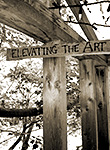Each spring Blackbird’s Introductions Reading Loop recognizes new artists of note whose work strikes us as exceptionally fine and full of promise. Joining this company for 2016 are poets Graham Hillard, Cindy King, and Dustin Pearson; fiction writers Colin Orr and Heidi Vornbrock Roosa; and essayist Caitlin McGill.
Hillard, King, and Pearson share an interest in investigating time and a persistent suspicion of alienation through the agency of often overlooked animals. Hillard muses on the “Oldest Squirrel Monkey in Captivity” that “It is impossible not to think of you / as mindful of the body they have // taken, living tribute whose every hour / affirms our genius.”
Cindy King in turn charges night crawlers to “Flee from my tread, peel / yourselves from your lovers. Return / once again to blindness.” And Pearson’s series of epistolary poems to his avatar, Mr. Hen, invites us to reconsider the animalistic act of inception, when “That open sore of theirs stretches and thins as if to grope and slow the thing’s momentum, to deliver it safely.”
Through careful language and affectionate observation, McGill, Orr, and Vornbrock Roosa find that the most significant journey a writer or character can make follows an emotional arc refracting interior subtlety onto an exterior world.
Thus McGill finds in her neighbor’s “rotting car whose interior is so packed that sometimes you cannot tell that the windows . . . are not darkened by tint but instead by items stacked high” an avenue for contemplating her mother’s grief.
Vornbrock Roosa’s Shon, who also struggles to understand her mother, uses marine biological science to articulate that complicated love: “Shon felt all she had rehearsed well up in her, all she knew to say. It began to spill out there and then. She heard herself, couldn’t stop it now. Talk of the bay, both bays, all bays, the work that needed to be done to preserve them.”
Orr’s language provides the vehicle for entering the world of graffiti tagging and for recognizing its importance to his narrator. In the narrator’s eyes, a wall of graffiti becomes “an artificial aurora borealis, struggling, chained to the earth, a welcoming sight to nighttime travelers and revelers.”
The First Novelist Reading Loop presents Angela Flournoy, winner of the 2016 Cabell First Novelist Award for The Turner House, which takes Detroit in its rough-edged beauty and simmering tensions as its subject. As reviewer Matthew Phipps notes, however, “Flournoy approaches her material through the wider lens of fiction, offering readers a harmonious and ultimately reassuring vision of home and familial love.”
Flournoy reads an excerpt from the novel before joining a panel discussion about the process of writing and publishing. Also included is Flournoy’s craft-based conversation with members of the VCU community. A review of the The Turner House appears in Nonfiction, and an excerpt from the novel appears in Fiction.
The Claudia Emerson Reading Loop remembers the poet through her work as it was read by Kathleen Graber, Jill McCorkle, Emilia Phillips, Wyatt Prunty and other students, colleagues, admirers, and friends at the 2016 AWP Conference in Los Angeles. Also included are Andrew Hudgins’s essay “Claudia Emerson: Elegy After Elegy,” reprinted here with permission from The Writer's Chronicle, and Lauren Miner’s collection of photographs of Emerson’s Richmond tree house, the summer 2014 site of an extended “treeshop” with her VCU poetry students.
Often the writers in this issue question how much our present moment dissociates us all from a shared past. They examine the wounded moment we are living through, diagnosing the extent to which the essential processes that bind us have broken down.
A few, like Dana Crum, prognosticate: “You are alone. And no one / is coming to save you.” Others scurry backward, through myth and doctrine, devising, on the fly, new methodologies for soul-triage. Margaret Gibson reminds us that we are “wed to a cosmos / light-years deep,” even if the “prism of lit dew” gracing “the spray of fern” at her refigured Eurydice’s ankle “as yet clarifies nothing.”
C. Dale Young conjures the ghost of Isabella of Castile, foremother of his own mestizo blood, to witness, “Los blancos now require more than beads.” How, against his own desire, he has “bowed” and “smiled” and “deferred,” to them with gestures “as common as salt, as common as rain.”
Kathy Fagan’s speaker evolves from a being “preserved by something” in the world to “the preserving spirit” undergirding it, and Diana Arterian sketches one possible tomorrow as a “frowning wanderer” committing a “little wild crime” even as “the earth licks the grave.” Jennifer Franklin orders us, like a general from a contested hilltop, to “take over the music that pounds through every / living thing.” Not to secure a certain destiny but because “every song of grief is still song.”
Derek Mong’s visionary perambulation of the San Francisco cityscape—its “sumptuous destitution,” its streets “bright with constellated smart phones / and sparks” off trolleys—leads somehow through the ancient desert where sainted hermit and harlot parents of Christianity scrawled their encyclicals in sand.
Perhaps it is no accident that human tongues have evolved to name one fifth of all we taste as bitter. Haunted by “grandmothers giving hickeys to / bruised plums,” Vi Ki Nao’s sumptuous poetic recipes taunt, “If your sleep is champagne / Mine is whiskey on ice,” geared for the palates of “sinners craving / Thunderstorms.” Seth Brady Tucker’s “Kwik-n-Reddy™ Pastry Recipe for Poetry Golem” lampoons a very different culinary tradition with the earthy certainty that we all embody a “dash [of] pain,” a “pinch [of] lust,” and a “hint [of] madness.”
In Fiction, Zoe Gadegbeku’s protagonist has been ambushed by a grief that has booted her out of the regular rhythm of time that we expect to anchor a reality we trust. “What does it feel like to attend a stranger’s funeral?” she wonders. “It’s a hazy sort of feeling, really. You think that you may have lost everything and everyone that is important to you, but the edges of your grief have been blurred, softened by denial.”
The ambition to control time and possibility undergirds Amina Gautier’s characters as they survey the presents received at a baby shower, anticipating the arrival of a daughter. How might these presents determine her future, they ask. “She wants to return the presents with notes of apology that say: No princesses allowed. Her husband says they can accept the gifts and toss them, or pass them on to others. But it’s not just one gift.”
A baby, their fifth, also dominates the world of Hattie and Abel, Janet Peery’s couple making their way through the decades of the post–war twentieth century. The coming child raises uneasy questions for them both, and Hattie particularly dreads the smothering attention the new child will demand, the sense of self she will misplace. “Maybe in order to consider the things she liked most to think about, the great mysteries of faith and love and hope and to feel like herself in her own skin, she simply needed great stretches of quiet.”
In Nonfiction, Paisley Rekdal’s evocation of a particular day—“The late afternoon sun is fierce. The cool noon temperature has slowly heated up under a thick bank of clouds that trap the sun but block any breeze, turning the air into a muggy broth”—breaks like a tensile wire when the past itself, in the person of a man wielding a knife, erupts into the lives of shoppers at a Salt Lake City grocery store.
E.L. Tremblay, on the other hand, confronts a disruption within—one initiated by her own waywardly beating heart: “The third time it happens, it scares me enough that I tell my mother, but she dismisses it offhand as asthma and I am willing to believe her because I am nine.”
Kelly Cherry, Chelsea Gillenwater, Amanda Goemmer, Rosanna Oh, and Cassie Pruyn review new books by Duffie Taylor, Rae Meadows, Sara Majka, Jane Wong, and Joshua Jennifer Espinoza to complete the section.
In Gallery, Liz Appel’s short dream play poses the question: “If we could just / find one we both agree on, / one story / from when we were young, / wouldn’t that, / just for a moment, / erase the distance?”
Jorge Miguel Benitez surveys the paintings of Javier Tapia with another kind of question entirely: “What can paint do?” This query finds its answer in the precise mastery the artist brings to the medium of watercolor.
Readings by Carrie Brown and Hiba Krisht (celebrating the Tarumoto Short Fiction Prize), and Gregory Kimbrell and Allison Titus appear in Features to complete the issue. ![]()
Return to top menus | Browse issue
















